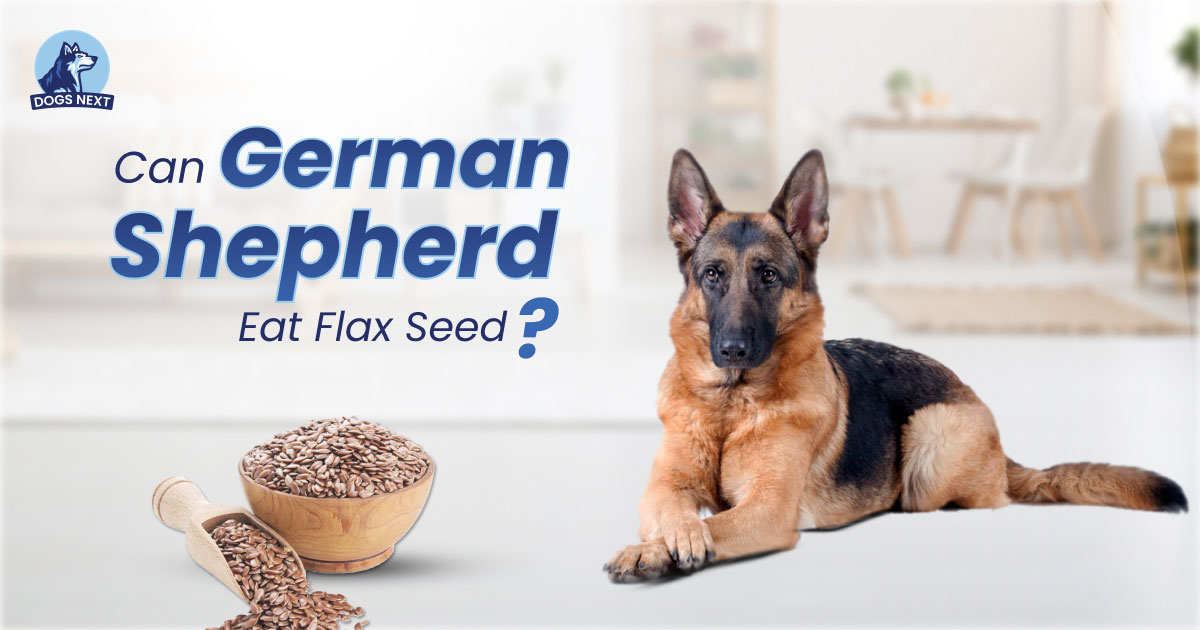Flax seed is a nutritious addition to a German Shepherd’s diet. It is rich in omega-3 fatty acids, which promote healthy skin and a shiny coat. Flax seed also contains fiber, aiding in digestive health. Including flax seed can help reduce inflammation, support joint health, and boost the immune system.
Always ensure the flax seed is ground or in oil form for better absorption. Consult your vet to determine the appropriate amount for your dog’s specific needs. Remember, moderation is key to avoid any potential digestive issues. Incorporating flax seed can contribute to a balanced and healthy diet for your German Shepherd.
Flaxseed In Animal Diets
Flaxseed is gaining popularity as a health supplement for dogs. Can German Shepherds eat flaxseed? Yes, they can, and it can be a great addition to their diet. Flaxseed in animal diets offers numerous benefits, making it a valuable component for our furry friends.
Benefits Of Flaxseed For Dogs
Flaxseed is packed with nutrients. It contains omega-3 fatty acids, fiber, and lignans. These nutrients help support a dog’s overall health.
- Omega-3 Fatty Acids: Help reduce inflammation and promote a healthy coat.
- Fiber: Aids in digestion and helps maintain a healthy weight.
- Lignans: Have antioxidant properties that support the immune system.
How Much Flaxseed Should You Give Your German Shepherd?
It’s essential to give the correct amount of flaxseed to your dog. Too much can cause digestive issues. Here’s a simple guide:
| Dog Weight | Daily Flaxseed Amount |
| Under 30 lbs | 1/2 teaspoon |
| 30-70 lbs | 1 teaspoon |
| Over 70 lbs | 1 1/2 teaspoons |
Possible Side Effects Of Flaxseed
Though flaxseed is beneficial, it can cause side effects if not introduced properly. Some dogs may experience:
How To Introduce Flaxseed To Your Dog’s Diet
Start with a small amount. Gradually increase it over a few days. Always monitor your dog’s reaction to the new food. Mix flaxseed into their regular meals. Ground flaxseed is easier for dogs to digest.
Nutritional Benefits Of Flaxseed For Dogs
Flaxseed is a popular supplement for dogs, offering various health benefits. German Shepherds, known for their energy and intelligence, can benefit from flaxseed in their diet. Adding flaxseed to your German Shepherd’s meals can enhance their overall well-being.
1. Omega-3 And Omega-6 Fatty Acids
Flaxseed is rich in Omega-3 and Omega-6 fatty acids. These essential fats support a healthy coat and skin. They also help reduce inflammation and support brain function.
2. High Fiber Content
Flaxseed contains high levels of dietary fiber. Fiber aids in digestion and helps maintain a healthy weight. It also helps regulate blood sugar levels in dogs.
3. Rich In Lignans
Lignans are powerful antioxidants found in flaxseed. They help boost the immune system and may have anti-cancer properties. Lignans also support hormonal balance in dogs.
4. Protein Source
Flaxseed provides a good amount of plant-based protein. Protein is essential for muscle development and repair. It also supports overall growth and maintenance.
5. Essential Vitamins And Minerals
Flaxseed is packed with vitamins and minerals like B vitamins, magnesium, and manganese. These nutrients are vital for energy production and metabolic health.
| Nutrient | Benefit |
| Omega-3 and Omega-6 Fatty Acids | Healthy coat, reduced inflammation, brain function |
| Fiber | Digestion, weight management, blood sugar regulation |
| Lignans | Antioxidant, immune support, hormonal balance |
| Protein | Muscle development, repair, growth |
| Vitamins and Minerals | Energy production, metabolic health |
Incorporating flaxseed into your German Shepherd’s diet can provide these amazing health benefits. Always consult your vet before making any dietary changes.
Health Benefits Of Flaxseed For German Shepherds Specifically
Flaxseed is a superfood packed with nutrients that benefit humans and dogs alike. But can German Shepherds eat flaxseed? The short answer is yes. Flaxseed offers numerous health benefits for German Shepherds specifically. This blog post explores these benefits, ensuring your furry friend enjoys a healthier, happier life.
Rich Source Of Omega-3 Fatty Acids
Flaxseed is a rich source of omega-3 fatty acids. These acids help improve your German Shepherd’s coat and skin health. A shiny, soft coat often indicates a healthy dog. Omega-3s also help reduce inflammation and support heart health.
Excellent Fiber Content
German Shepherds need a diet high in fiber. Flaxseed is an excellent source of dietary fiber. Fiber helps regulate digestion and prevent constipation. This makes flaxseed a great addition to your dog’s diet.
Boosts Immune System
Flaxseed contains lignans, which have antioxidant properties. These properties help boost the immune system. A stronger immune system means your German Shepherd is better protected against diseases and infections.
Supports Joint Health
German Shepherds are prone to joint issues, especially as they age. Flaxseed contains alpha-linolenic acid (ALA), which helps reduce joint inflammation. This can improve mobility and reduce pain for your dog.
Promotes Healthy Digestion
Flaxseed helps promote healthy digestion. The fiber content aids in the digestive process. This is particularly beneficial for German Shepherds with sensitive stomachs.
Rich In Essential Nutrients
Flaxseed is rich in essential nutrients like magnesium, manganese, and vitamin B1. These nutrients support overall health and well-being. Including flaxseed in your German Shepherd’s diet provides these vital nutrients.
Table Of Nutrients In Flaxseed
| Nutrient | Amount per 100g |
| Omega-3 Fatty Acids | 22.8g |
| Fiber | 27g |
| Magnesium | 392mg |
| Manganese | 2.5mg |
| Vitamin B1 | 1.6mg |
Risk Of Overconsumption
Flax seed can be a healthy addition to a German Shepherd’s diet, but it’s crucial to understand the risk of overconsumption. While flax seed is packed with omega-3 fatty acids, fiber, and antioxidants, excessive intake can lead to health issues. Monitoring the amount fed to your dog ensures they receive the benefits without the risks.
Potential Health Risks Of Overeating Flax Seed
Overconsumption of flax seed may cause digestive problems in German Shepherds. Large amounts can lead to diarrhea, bloating, and gas. These digestive issues can be uncomfortable for your dog and may require veterinary attention.
Allergic Reactions
Some German Shepherds may have allergic reactions to flax seed. Symptoms include itching, swelling, and redness. If you notice any signs of an allergic reaction, stop feeding flax seed and consult your vet immediately.
Imbalance In Nutrient Intake
Feeding too much flax seed can cause an imbalance in nutrient intake. Flax seed is high in omega-3 fatty acids but lacks other essential nutrients. A balanced diet is necessary for your German Shepherd’s overall health.
Phytate Content
Flax seeds contain phytates, which can interfere with mineral absorption. High phytate intake can reduce the absorption of calcium, magnesium, and zinc. Ensuring moderate flax seed consumption can prevent potential nutrient deficiencies.
Recommended Amount Of Flax Seed
To avoid overconsumption, feed your German Shepherd small amounts of flax seed. A general guideline is 1 teaspoon of ground flax seed per 10 pounds of body weight. Always consult your vet for personalized advice.
Signs Of Overconsumption
Watch for signs of overconsumption, such as loose stools, lethargy, or excessive itching. If any of these symptoms appear, reduce the amount of flax seed in their diet. Consistent monitoring helps keep your dog healthy and happy.
Is Flaxseed Safe For German Shepherds?
German Shepherds are known for their intelligence, loyalty, and strong build. As pet owners, ensuring they get the right nutrition is crucial. A commonly asked question is, “Can German Shepherds eat flaxseed?” This blog post will explore whether flaxseed is safe for these dogs and the benefits it might offer.
Flaxseed is generally safe for German Shepherds when given in moderation. It is a rich source of Omega-3 fatty acids, which support skin and coat health. However, there are some considerations to keep in mind before adding flaxseed to their diet.
How Much Flaxseed Should You Give?
Proper dosage is essential to avoid any health issues. A general guideline is:
| Weight of German Shepherd | Amount of Flaxseed (per day) |
| Up to 50 lbs | 1/2 teaspoon |
| 50-100 lbs | 1 teaspoon |
| Over 100 lbs | 1.5 teaspoons |
Possible Side Effects Of Flaxseed
While flaxseed is beneficial, there are potential side effects. Too much flaxseed can cause:
- Diarrhea: High fiber content can upset the digestive system.
- Allergic Reactions: Some dogs may be allergic to flaxseed.
- Hormonal Imbalance: Excessive lignans might interfere with hormone levels.
How To Introduce Flaxseed To Your German Shepherd’s Diet
Start with a small amount and observe your dog’s reaction. Gradually increase the dosage if there are no adverse effects. Ground flaxseed is easier to digest compared to whole seeds.
How To Feed Flaxseed To Your German Shepherd
German Shepherds are known for their strength, intelligence, and loyalty. Many pet owners wonder about the best foods for their furry friends. Can German Shepherds eat flaxseed? Yes, they can! Flaxseed offers numerous health benefits. This guide explains how to feed flaxseed to your German Shepherd safely.
How Much Flaxseed Should You Give?
Start with small amounts. For a German Shepherd, 1 teaspoon of ground flaxseed per day is safe. Gradually increase to 1 tablespoon over a few weeks. Always monitor your dog for any adverse reactions.
Ground Flaxseed Vs. Whole Flaxseed
Ground flaxseed is easier for dogs to digest. Whole flaxseeds might pass through their system undigested. Use a coffee grinder to grind whole seeds at home.
Mixing Flaxseed With Your Dog’s Food
Mix ground flaxseed with your dog’s regular food. Sprinkle it on wet or dry food. Ensure it’s evenly distributed to avoid large clumps.
Flaxseed Oil As An Alternative
Flaxseed oil is another option. Add 1 teaspoon to your dog’s meal. It provides similar benefits to ground flaxseed. Store flaxseed oil in the refrigerator to keep it fresh.
Homemade Flaxseed Dog Treats
Make homemade treats using flaxseed. Here’s a simple recipe:
- Mix 1 cup of whole wheat flour, 1/2 cup of ground flaxseed, and 1/2 cup of peanut butter.
- Add 1/4 cup of water and mix until a dough forms.
- Roll out the dough and cut into shapes.
- Bake at 350°F for 20 minutes.
Let the treats cool before serving them to your dog.
Monitoring Your Dog’s Health
Observe your German Shepherd’s health after introducing flaxseed. Look for signs of allergies or digestive issues. Consult your vet if you notice any problems.
Benefits Of Flaxseed For German Shepherds
Flaxseed is rich in omega-3 fatty acids, which promote healthy skin and coat. It also contains fiber, aiding in digestion. Flaxseed provides antioxidants that support overall health.
How Much Flaxseed Is Recommended For German Shepherds
Flaxseed is a nutritional powerhouse for German Shepherds, offering a rich source of omega-3 fatty acids, fiber, and antioxidants. But how much flaxseed is recommended for German Shepherds? To ensure your furry friend gets the right amount of this nutritious seed, follow these guidelines for optimal health benefits.
How Much Flaxseed Should You Give Your German Shepherd?
German Shepherds can benefit greatly from flaxseed, but it’s essential to provide the correct amount. Small amounts of flaxseed can be added to your dog’s diet daily.
| Dog Weight | Flaxseed Amount |
| Up to 20 lbs | 1/4 teaspoon |
| 20 – 50 lbs | 1/2 teaspoon |
| Over 50 lbs | 1 teaspoon |
Benefits Of Flaxseed For German Shepherds
Flaxseed offers numerous health benefits for your German Shepherd:
Precautions When Feeding Flaxseed
Ensure you grind the flaxseed before feeding it to your dog. Whole flaxseed can pass through their digestive system without being absorbed. Also, introduce flaxseed gradually to avoid digestive upset.
Frequently Asked Questions
Can German Shepherds Safely Eat Flax Seeds?
Yes, German Shepherds can safely eat flax seeds. They offer numerous health benefits. However, moderation is key. Always consult your vet.
What Are The Benefits Of Flax Seeds For German Shepherds?
Flax seeds are rich in omega-3 fatty acids. They help improve skin, coat, and joint health. They also support the immune system.
How Should Flax Seeds Be Given To German Shepherds?
Flax seeds should be ground before feeding. Whole seeds can pass undigested. Mix a small amount into their regular food.
How Much Flax Seed Can A German Shepherd Eat?
Generally, a teaspoon per day is safe. Always start with a smaller amount. Adjust based on your dog’s size and needs.
Conclusion
Flax seeds can be a beneficial addition to your German Shepherd’s diet. They offer omega-3 fatty acids and fiber. Always consult your vet before introducing new foods. Monitor your dog’s reaction to ensure they tolerate flax seeds well. Feeding flax seeds in moderation can support your dog’s overall health and wellness.

I’m David, an expert contributor and writer, with two furry friends of my own, I know the challenges of raising and caring for dogs. From training to nutrition and health, my goal is to provide valuable insights and advice to help create strong bonds and happy, healthy lives. Find me in Twitter.




